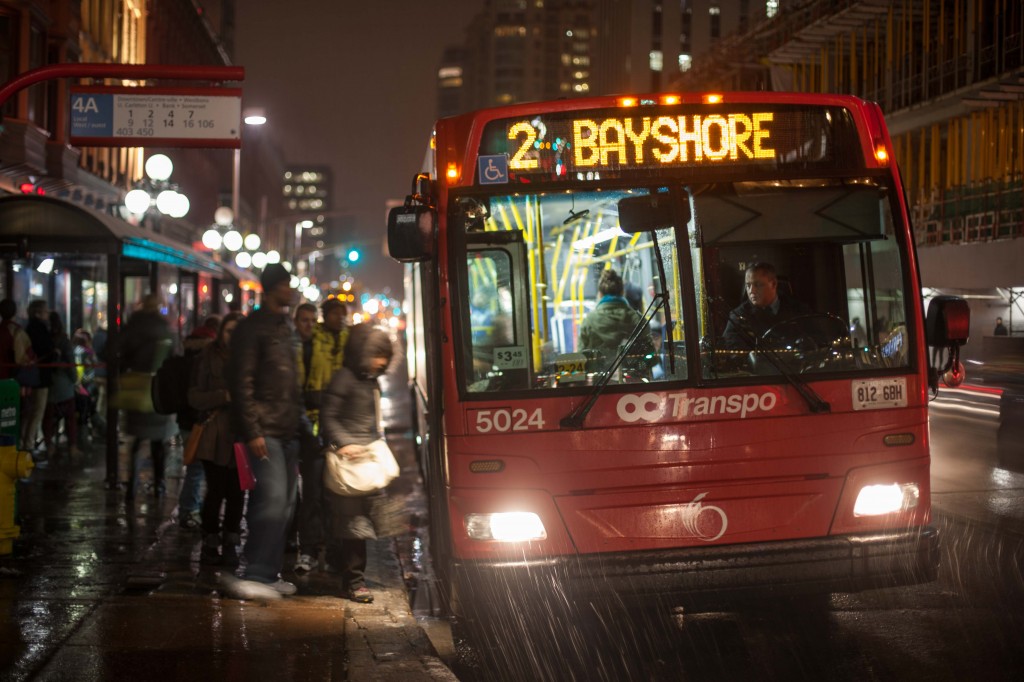By Evelyn Harford

OC Transpo has the highest single-ride adult fare in Canada. As fares rise in the city of Ottawa, OC Transpo has had very limited discounts for homeless and low-income people for the last two years.
Catherine McKenney, councillor-elect for Somerset ward, wants to change that.
“The one thing I will be looking at around transit is the reinstatement of the community bus pass for low-income residents,” said McKenney. “I think it’s important. I think it disproportionately affects our most vulnerable residents.”
Right now the only homeless or low-income people who qualify for a break on transit fares are those who have a physical or intellectual disability.
A review of the OC Transpo annual reports from 2009-2012 and a City of Ottawa report on poverty in 2010 shows that approximately 60,000 OC Transpo riders are below the low-income cut-off.
During the recent municipal election in Ottawa some candidates heard demands for lower fares.
“When I was out campaigning I visited different shelters,” said McKenney. “It is the number one issue I heard from folks. They have no options to get anywhere in the city without a community bus pass.”
OC Transpo first introduced a community pass in 2006.
David Chernushenko, city councillor for Capital ward said at some point between 2011-2012 the eligibility requirements for the community pass changed. The pass would no longer be available for people based on their income status alone.
The discounted OC Transpo monthly community pass, currently costs $40.75 compared to $100.75 for the regular adult monthly pass.
The city budget will be tabled in January, 2015 and Chernushenko expects this issue will be raised during the budget deliberations.
“I do feel the city can and should look to find simpler to ways for people of a demonstrably lower income to get passes or tickets at a lower fare.”
But Chernushenko said it won’t be easy given the budget cuts from the province.
“It is a challenge. It represents new money. It represents the city finding money to offer those passes at a discounted rate that we haven’t currently budgeted for. So that does mean a tax increase or money taken from somewhere else,” said Chernushenko.
“It’s bad,” said Rafael Custas, referring to the regular $100.75 adult monthly pass. “I just cannot buy it.”

Custas arrived from Honduras six months ago and has been able to hold a part-time job. However, the high cost of transit has made it difficult for him to work full-time hours.
Although a federal tax credit of 15 per cent is offered to those purchasing monthly passes, Custas say that this is not enough.
Homeless and low-income individuals rely on the Ottawa Mission’s free bus tickets. These are for people who can prove that they have an appointment with social services, which is not within walking distance of the city centre.
“While the cost of public transportation is a significant challenge for municipalities, it is critical to seek ways to make public transit more affordable for low income residents as an important strategy to improve their situation,” said the most recent City of Ottawa report on poverty.
OC Transpo has not yet provided an official response on this matter.
John O’Hara, a regular at St. Joseph’s Parish for the free meals offered daily, said that if people can’t afford groceries, they can’t afford a monthly pass at the regular fare.

“They’re just not giving us enough money to live on,” O’Hara said, “Give me a community pass.”